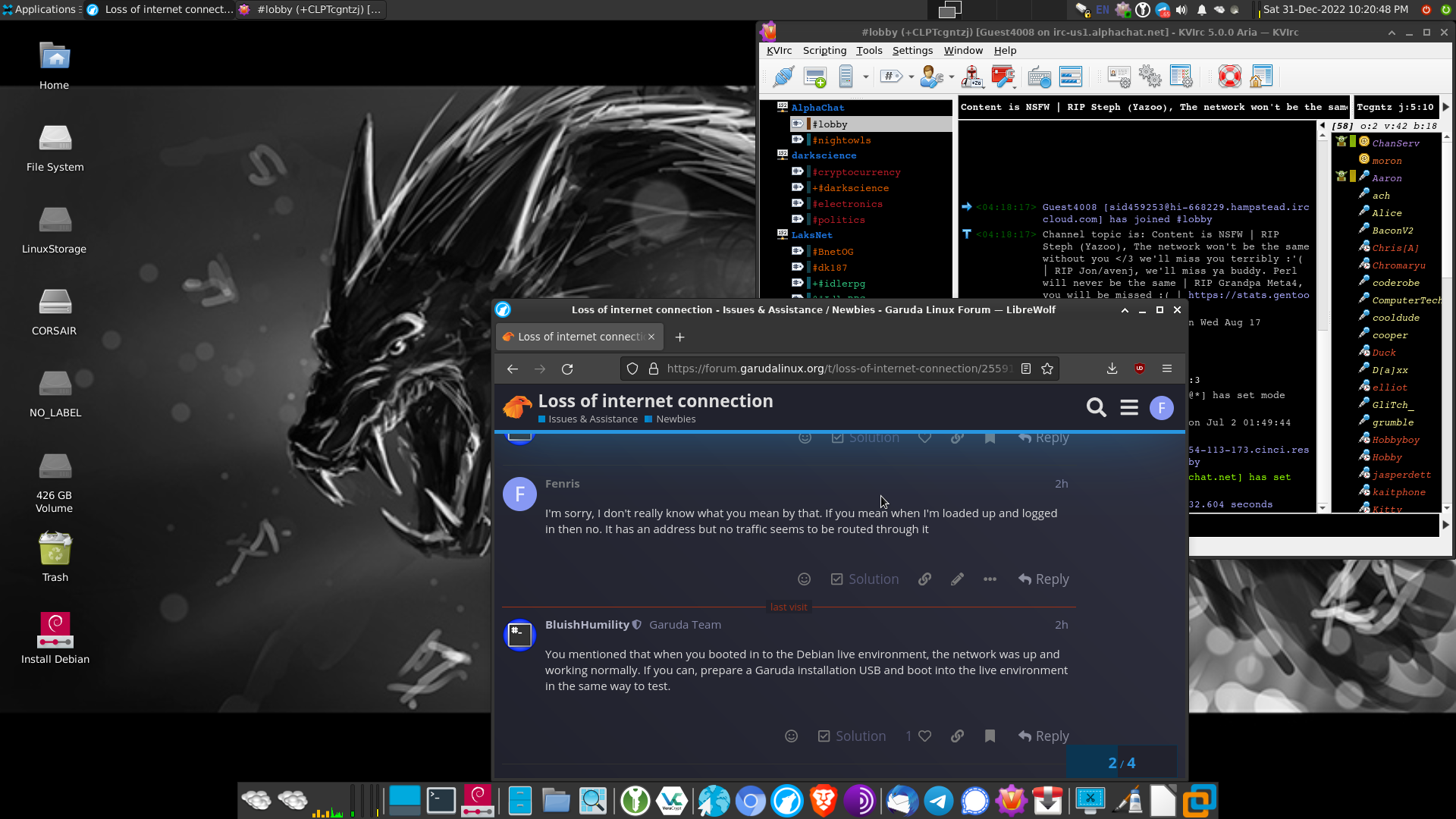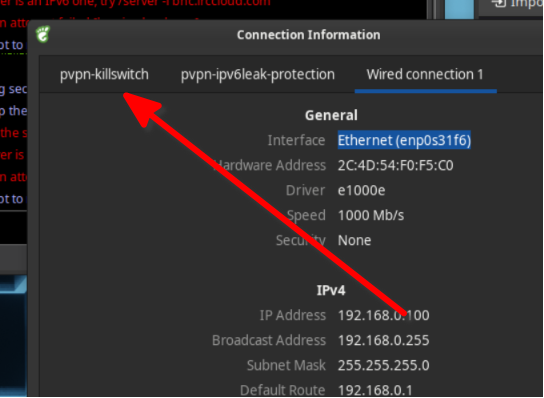Hello,
Before I even get started..
inxi -Faz
System:
Kernel: 5.15.85-1-lts arch: x86_64 bits: 64 compiler: gcc v: 12.2.0
parameters: BOOT_IMAGE=/@/boot/vmlinuz-linux-lts
root=UUID=486c73c2-5563-4c69-9874-e2de0a74f848 rw rootflags=subvol=@
quiet splash rd.udev.log_priority=3 vt.global_cursor_default=0
systemd.unified_cgroup_hierarchy=1
resume=UUID=f029951c-d709-4801-85a6-60d222f980bc loglevel=3 ibt=off
Desktop: Xfce v: 4.18.0 tk: Gtk v: 3.24.35 info: xfce4-panel wm: xfwm
v: 4.18.0 vt: 7 dm: LightDM v: 1.32.0 Distro: Garuda Linux base: Arch Linux
Machine:
Type: Desktop Mobo: ASUSTeK model: PRIME B250M-C v: Rev X.0x
serial: <superuser required> UEFI: American Megatrends v: 0404
date: 12/28/2016
CPU:
Info: model: Intel Core i3-7100 bits: 64 type: MT MCP arch: Kaby Lake
gen: core 7 level: v3 note: check built: 2018 process: Intel 14nm family: 6
model-id: 0x9E (158) stepping: 9 microcode: 0xF0
Topology: cpus: 1x cores: 2 tpc: 2 threads: 4 smt: enabled cache:
L1: 128 KiB desc: d-2x32 KiB; i-2x32 KiB L2: 512 KiB desc: 2x256 KiB
L3: 3 MiB desc: 1x3 MiB
Speed (MHz): avg: 3900 min/max: 800/3900 scaling: driver: intel_pstate
governor: performance cores: 1: 3900 2: 3900 3: 3900 4: 3900 bogomips: 31199
Flags: avx avx2 ht lm nx pae sse sse2 sse3 sse4_1 sse4_2 ssse3 vmx
Vulnerabilities:
Type: itlb_multihit status: KVM: VMX disabled
Type: l1tf mitigation: PTE Inversion; VMX: conditional cache flushes, SMT
vulnerable
Type: mds mitigation: Clear CPU buffers; SMT vulnerable
Type: meltdown mitigation: PTI
Type: mmio_stale_data mitigation: Clear CPU buffers; SMT vulnerable
Type: retbleed mitigation: IBRS
Type: spec_store_bypass mitigation: Speculative Store Bypass disabled via
prctl and seccomp
Type: spectre_v1 mitigation: usercopy/swapgs barriers and __user pointer
sanitization
Type: spectre_v2 mitigation: IBRS, IBPB: conditional, RSB filling,
PBRSB-eIBRS: Not affected
Type: srbds mitigation: Microcode
Type: tsx_async_abort status: Not affected
Graphics:
Device-1: Intel HD Graphics 630 vendor: ASUSTeK driver: i915 v: kernel
arch: Gen-9.5 process: Intel 14nm built: 2016-20 ports: active: HDMI-A-3
empty: DP-1, DP-2, HDMI-A-1, HDMI-A-2 bus-ID: 00:02.0 chip-ID: 8086:5912
class-ID: 0300
Display: x11 server: X.Org v: 21.1.6 compositor: xfwm v: 4.18.0 driver: X:
loaded: intel unloaded: modesetting alternate: fbdev,vesa dri: i965
gpu: i915 display-ID: :0.0 screens: 1
Screen-1: 0 s-res: 1920x1080 s-dpi: 96 s-size: 508x285mm (20.00x11.22")
s-diag: 582mm (22.93")
Monitor-1: HDMI-A-3 mapped: HDMI3 model: Acer G247HYL serial: <filter>
built: 2016 res: 1920x1080 hz: 60 dpi: 92 gamma: 1.2
size: 530x300mm (20.87x11.81") diag: 604mm (23.8") ratio: 16:9 modes:
max: 1920x1080 min: 720x400
API: OpenGL Message: Unable to show GL data. Required tool glxinfo
missing.
Audio:
Device-1: Intel 200 Series PCH HD Audio vendor: ASUSTeK
driver: snd_hda_intel v: kernel bus-ID: 00:1f.3 chip-ID: 8086:a2f0
class-ID: 0403
Sound API: ALSA v: k5.15.85-1-lts running: yes
Sound Server-1: JACK v: 1.9.21 running: no
Sound Server-2: PulseAudio v: 16.1 running: yes
Sound Server-3: PipeWire v: 0.3.63 running: yes
Network:
Device-1: Intel Ethernet I219-V vendor: ASUSTeK driver: e1000e v: kernel
port: N/A bus-ID: 00:1f.6 chip-ID: 8086:15b8 class-ID: 0200
IF: enp0s31f6 state: up speed: 1000 Mbps duplex: full mac: <filter>
Device-2: Intel 82571EB/82571GB Gigabit Ethernet D0/D1
vendor: Hewlett-Packard NC360T Dual Port Server driver: e1000e v: kernel
pcie: gen: 1 speed: 2.5 GT/s lanes: 4 port: e020 bus-ID: 01:00.0
chip-ID: 8086:105e class-ID: 0200
IF: enp1s0f0 state: down mac: <filter>
Device-3: Intel 82571EB/82571GB Gigabit Ethernet D0/D1
vendor: Hewlett-Packard NC360T Dual Port Server driver: e1000e v: kernel
pcie: gen: 1 speed: 2.5 GT/s lanes: 4 port: e000 bus-ID: 01:00.1
chip-ID: 8086:105e class-ID: 0200
IF: enp1s0f1 state: down mac: <filter>
IF-ID-1: ipv6leakintrf0 state: unknown speed: N/A duplex: N/A
mac: <filter>
IF-ID-2: pvpnksintrf0 state: unknown speed: N/A duplex: N/A mac: <filter>
IF-ID-3: vmnet1 state: unknown speed: N/A duplex: N/A mac: <filter>
IF-ID-4: vmnet8 state: unknown speed: N/A duplex: N/A mac: <filter>
Drives:
Local Storage: total: 1.36 TiB used: 367.43 GiB (26.3%)
SMART Message: Required tool smartctl not installed. Check --recommends
ID-1: /dev/sda maj-min: 8:0 vendor: Samsung model: HD501LJ
size: 465.76 GiB block-size: physical: 512 B logical: 512 B speed: 1.5 Gb/s
type: N/A serial: <filter> rev: 0-12 scheme: MBR
ID-2: /dev/sdb maj-min: 8:16 vendor: Western Digital
model: WD10EARS-00Y5B1 size: 931.51 GiB block-size: physical: 512 B
logical: 512 B speed: 3.0 Gb/s type: N/A serial: <filter> rev: 0A80
scheme: MBR
Partition:
ID-1: / raw-size: 396.9 GiB size: 396.9 GiB (100.00%)
used: 367.43 GiB (92.6%) fs: btrfs dev: /dev/sda2 maj-min: 8:2
ID-2: /boot/efi raw-size: 512 MiB size: 511 MiB (99.80%)
used: 584 KiB (0.1%) fs: vfat dev: /dev/sda3 maj-min: 8:3
ID-3: /home raw-size: 396.9 GiB size: 396.9 GiB (100.00%)
used: 367.43 GiB (92.6%) fs: btrfs dev: /dev/sda2 maj-min: 8:2
ID-4: /var/log raw-size: 396.9 GiB size: 396.9 GiB (100.00%)
used: 367.43 GiB (92.6%) fs: btrfs dev: /dev/sda2 maj-min: 8:2
ID-5: /var/tmp raw-size: 396.9 GiB size: 396.9 GiB (100.00%)
used: 367.43 GiB (92.6%) fs: btrfs dev: /dev/sda2 maj-min: 8:2
Swap:
Kernel: swappiness: 133 (default 60) cache-pressure: 100 (default)
ID-1: swap-1 type: zram size: 23.36 GiB used: 256 KiB (0.0%) priority: 100
dev: /dev/zram0
ID-2: swap-2 type: partition size: 68.36 GiB used: 0 KiB (0.0%)
priority: -2 dev: /dev/sda1 maj-min: 8:1
Sensors:
System Temperatures: cpu: 36.0 C mobo: N/A
Fan Speeds (RPM): N/A
Info:
Processes: 279 Uptime: 28m wakeups: 0 Memory: 23.36 GiB
used: 4.06 GiB (17.4%) Init: systemd v: 252 default: graphical
tool: systemctl Compilers: gcc: 12.2.0 clang: 14.0.6 Packages: 1916
pm: pacman pkgs: 1914 libs: 412 tools: pamac,paru,trizen,yay pm: flatpak
pkgs: 2 Shell: Bash v: 5.1.16 running-in: xfce4-terminal inxi: 3.3.24
So here is the scoop, I have an ethernet cable connected to my PC, Garuda sees an IP address with it so it's connected. I know there is nothing wrong with the hardware cause I booted up debian live on a flash drive so, all my hardware works, I'm able to use telegram, signal, tor, browers without any issues on that bootable linux.
Now I boot up into Garuda, I see my system has an IP address in the connection manager. However, nothing is able to make connections with anything on my network connection. Everything just died on it. So I had some power outage, everything crashed, I rebooted and I get this issue. This is the 2nd time this happened to me. The first time, sometimes disabling the ethernet adapter and re-enabling it about 20/30 times got it going again but this time, I have no success. This problem is driving me mad cause I can't do anything with it. No IRC, no Telegram, no Thunderbird, nothing wants to go out on this network connection and function.


